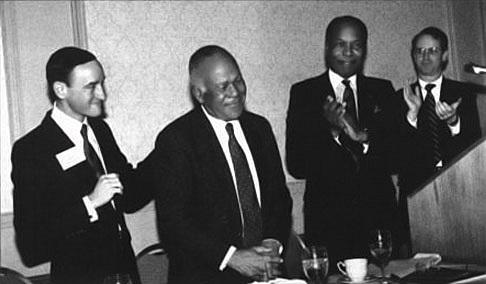Inaugural MLK Scholar Henry McBay, 1991

MIT MLK Celebration Banquet, December 1990. Left to right: Mark S. Wrighton, MIT Provost; Henry C. McBay, inaugural MLK Visiting Scholar; Louis Sullivan, US Secretary of Human Services; and Charles M. Vest, MIT President.
Henry Ransom Cecil McBay (1914-1995) became the first ever appointed MLK Visiting Scholar at MIT in 1990. He was a chemist and retired Distinguished Professor of Chemistry at Morehouse College, Dr. Martin Luther King’s alma mater.
McBay loved to teach 'miracles'. One of his favorite chemistry lecture-demonstrations was making table salt by combining two poisons: sodium and chlorine. His work with dangerous chemistry dated back to his doctoral student days at the University of Chicago, where he had enrolled in order to defer the draft after the events at Pearl Harbor in 1945. He was the only black student in his graduate class, but a number of black PhDs in chemistry had already preceded him, three MIT alums among them: Marron William Fort ’33, William Jacob Knox, Jr. ’35, and Henry Hill ’42. McBay’s dissertation topic, “Reactions of Atoms and Free Radicals in Solution," had come by chance, after his organic chemistry professor assigned him to synthesize commercially unavailable compounds using acetyl peroxide.
One application of his doctoral research led to the development of a treatment for prostate cancer. The first in history to handle such large quantities of acetyl peroxide, McBay became an expert on free radicals. Acetyl peroxide, according to McBay, “got to be very hot in organic chemistry at the time" among his American colleagues in the field. Despite their interest in this "state-of-the-art modern organic chemistry,” many avoided citing McBay's work on learning that he was black.
McBay went on to develop a chemistry education program for Liberia as part of a 1951 UNESCO mission and taught at Morehouse College for over three decades. His rigorous academic standards and his dedication to teaching and mentorship earned him the nickname "Little Giant". Over 50 chemistry majors under his tutelage went on to earn doctoral and medical degrees, at least two from MIT. McBay married Shirley Mathis, who served as Dean for Student Affairs at MIT.
At MIT
In 1990, an MLK Planning Committee at MIT selected McBay as the Institute's first MLK Visiting Scholar. A four-day gala symposium was held in his honor that included a presentation of McBay's biography and a chronology of African Americans in chemistry by History of Science professor at MIT Kenneth R. Manning. There was a panel by three scientists, among them William Jacob Knox, Jr. ’35, MIT's first black PhD in chemistry. McBay also visited the local high school, Cambridge Rindge and Latin, where he spoke to students enrolled in the Massachusetts Pre-Engineering Program (MASSPEP, a program designed to encourage minority students to pursue STEM fields). The celebrations concluded with a banquet that featured one of Dr. McBay's freshman chemistry students, then U.S. Secretary of Health and Human Services Louis Sullivan.
Former MIT Provost Mark S. Wrighton praised McBay for being “one of the nation’s leading educators of African Americans” and playing a crucial role “for more than 40 years as an undergraduate teacher in inspiring, helping, and driving 43 Morehouse students to go on to get PhDs in chemistry.”